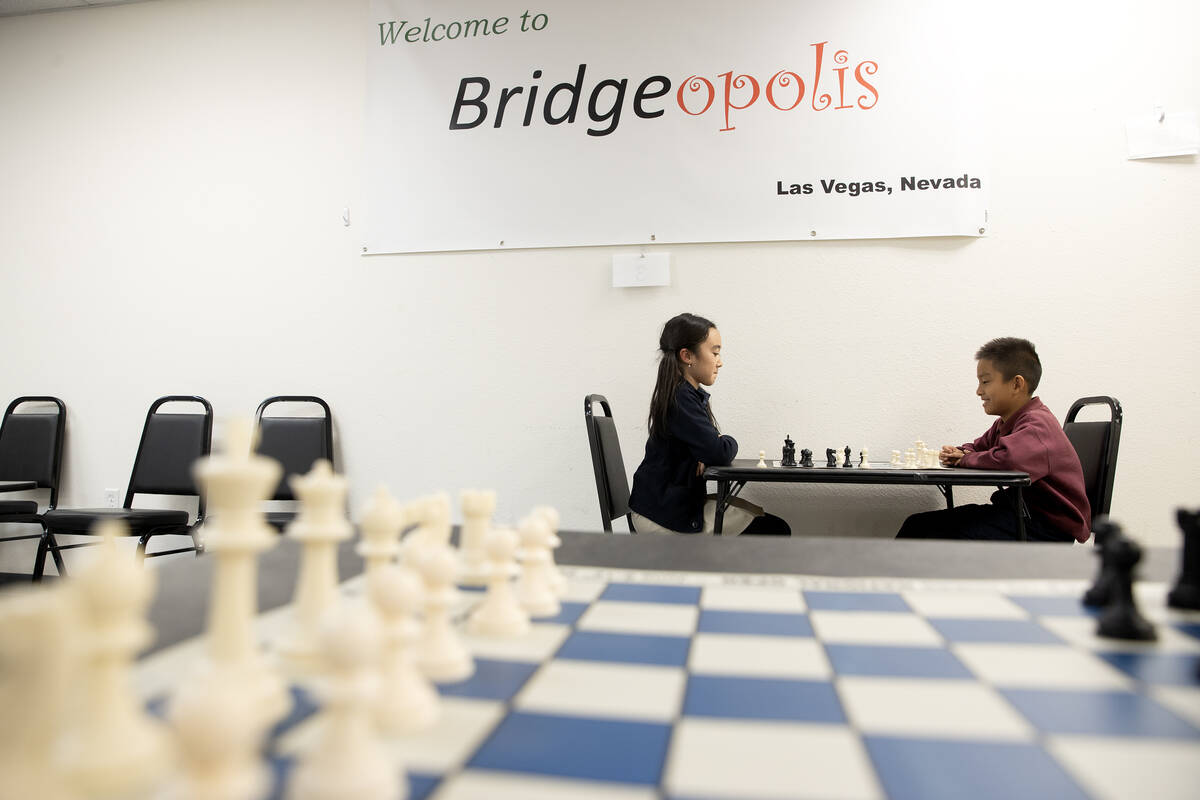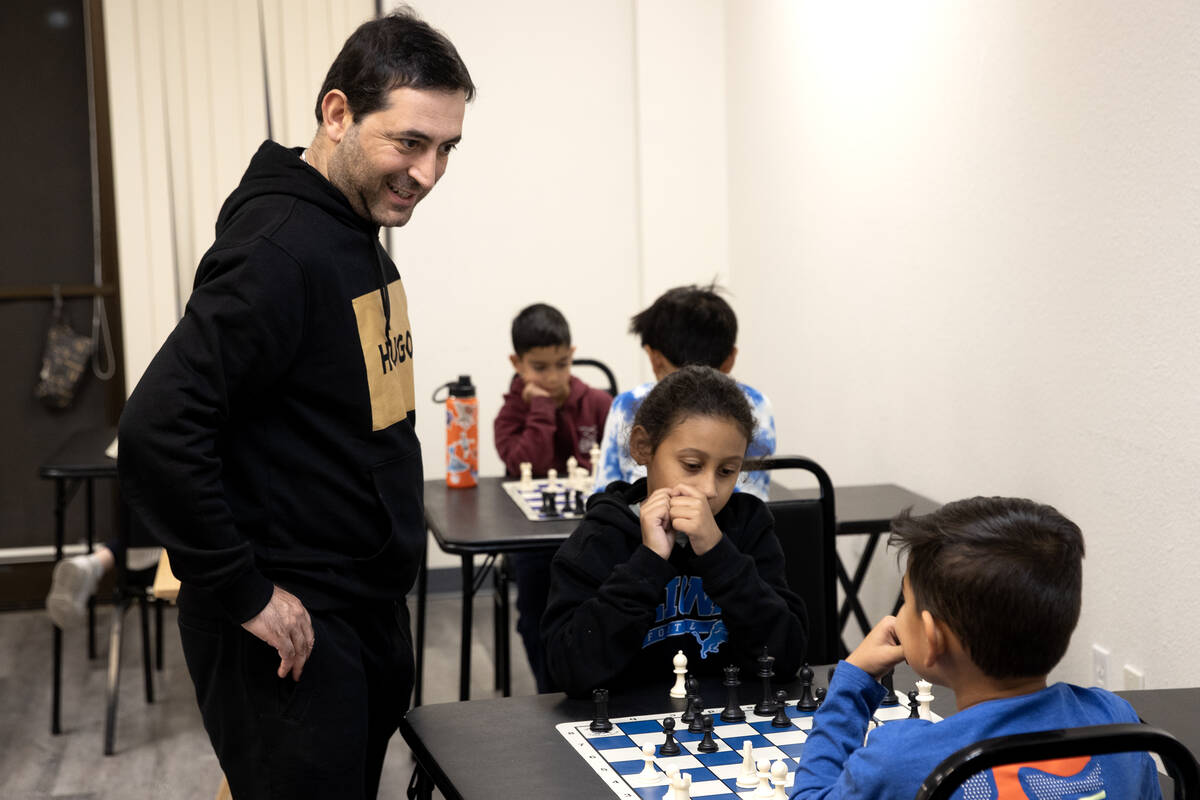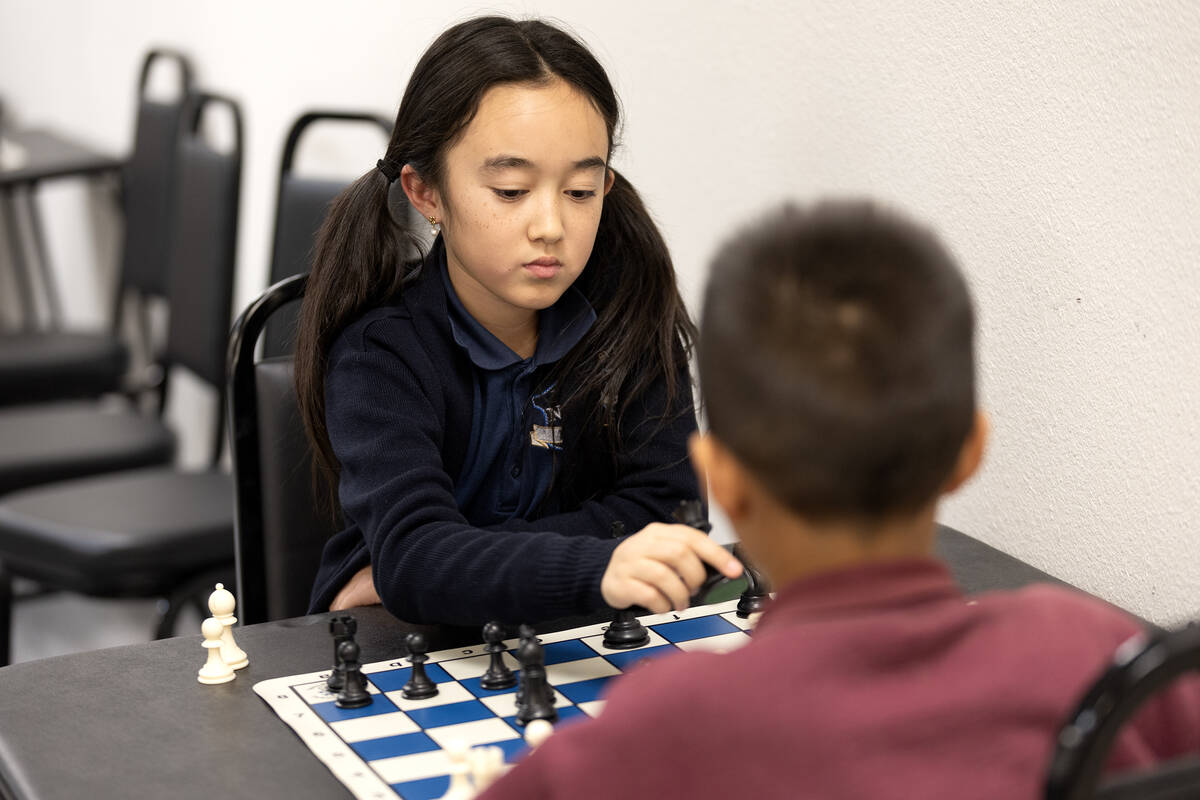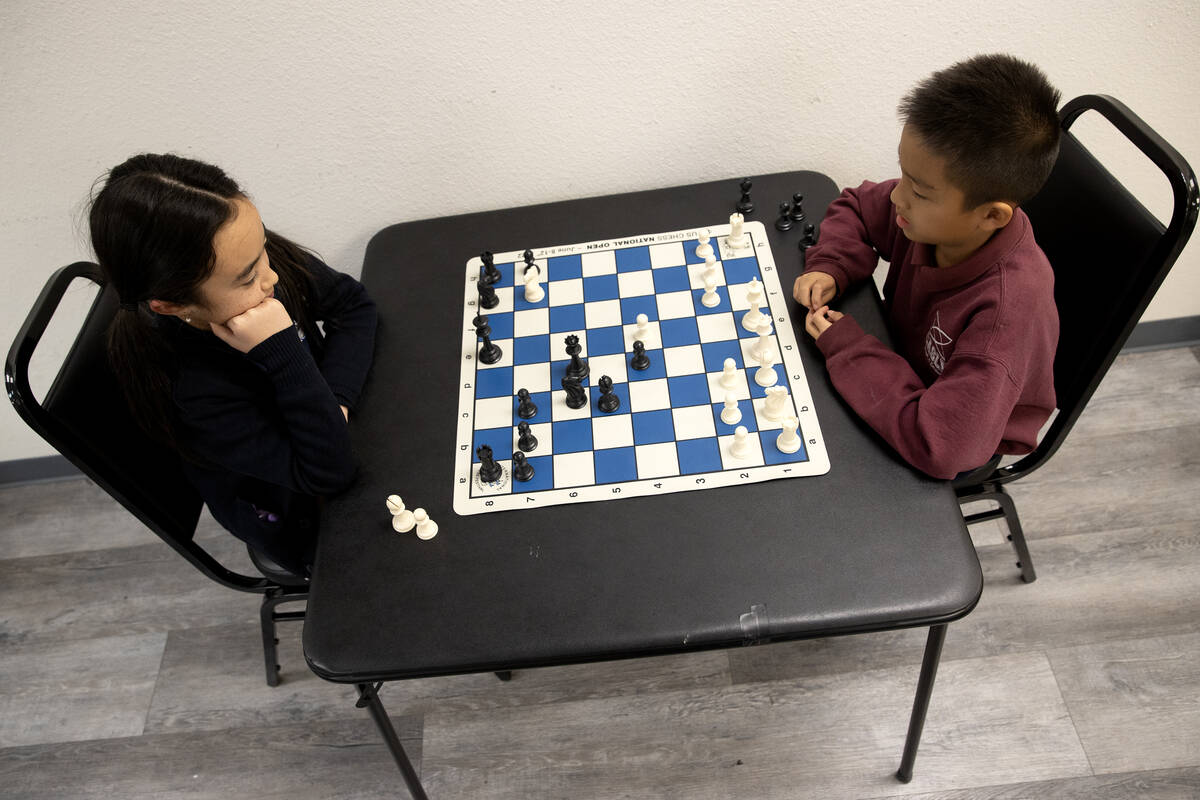Netflix, (alleged) cheating and a big tournament: Chess, welcome to Vegas
Tucked into an office complex on West Tropicana Avenue sits a plain, sparsely furnished room. Metal folding tables topped with chess pieces and chess boards are spaced evenly throughout the interior. The walls are bare, except for a poster of a red-haired woman staring over a chess board.
The poster’s caption reads: “The Queen’s Gambit.”
The sign on the door reads: “Bridgeopolis.”
During the COVID-19 pandemic in 2020, chess was the last thing on Marvin Raab’s mind. Instead, Raab, 59, started Bridgeopolis as an online club for bridge players seeking to connect with similarly isolated souls during the lockdown.
But in 2022 — as COVID restrictions waned and local interest in bridge dropped — Raab acquired the brick-and-mortar space on West Tropicana. He then turned Bridgeopolis into an official chess club and local affiliate of the United States Chess Federation.
“Bridge is a dying game, much like Latin is a dying language,” Raab said. When the former president of Nevada Chess (the official state affiliate) suggested he start an in-person chess club, Raab promptly added chess to the Bridgeopolis foundation.
Unlike bridge, chess is booming in Las Vegas. The last time Raab checked Bridgeopolis’ mailing list, he had over 300 names, from ages 6 to 80. Many are members of the national federation and can play in the official chess tournaments hosted at Bridgeopolis each year.
But on a weekday afternoon in late November, Bridgeopolis is devoted to chess instruction, not tournaments. Raab looks over several pairings of middle and high school students who move their chess pieces with gusto.
Walking between the chess boards is Andranik Matikozyan, an Armenian-born chess coach based in Las Vegas. Every few seconds, he stops next to a pair of students, points out a weak move or whispers a suggested improvement that can be made. He then moves on to another pairing.
Matikozyan, 44, is an international master, the second-highest class of chess players behind only the grandmasters. Having taught chess for 25 years, he sees it as not just a game, but as a template for living.
“Chess is like life,” Matikozyan says. “When you move without thinking, you make mistakes,” he adds, as if thinking aloud.
A local outpost for the national chess scene
On Dec. 26, Horseshoe Las Vegas will host the 33rd annual North American Open. It is one of the four biggest tournaments on the national chess calendar, with the National Open (also in Las Vegas) and two tournaments in Chicago and Philadelphia.
An estimated 1,000 chess players are expected to participate in this year’s tournament. The top-ranked “open” section will feature grandmasters, international masters and other strong players from around the country. Each player will play nine matches, with one point awarded for a win, a half-point for a draw and none for a loss. Cash prizes are awarded to the top finishers.
Eight lower sections will also be up for grabs. In these sections, players are grouped according to their official chess ratings. The lowest-rated players generally occupy the lowest section, but they can voluntarily “play up” into a section containing players stronger than they are.
Daniel Lucas, senior director of strategic communication of the national chess federation, notes Las Vegas’ history as a host city for chess. The North American Open “is a major event on the (national) tournament calendar. It carries the designation Heritage Event and American Classic, both of which celebrate its longevity, size, and importance,” Lucas says.
“Las Vegas has long been a regular part of the United States Chess tournament scene,” says Lucas, adding that national tournaments have been held here since “at least back to the 1960s.”
So chess tournaments have been in Las Vegas decades before the Aces, Golden Knights or Raiders showed up.
Post-COVID demand for over-the-board matches
Participation in the North American Open — an “over-the-board” tournament where players sit across from each other and play under strict time limits — has trended upward for years. Discounting the COVID-canceled tournament in 2020 (when an online version still drew 531 players), in-person participation in the North American Open has risen every year from 2014 (664 players) to 2021 (891), to last year’s record 985 players.
Tom Brownscombe — a Las Vegas-based grandmaster and current senior champion for Nevada — offers several explanations for this growth. Pointing to the poster of “The Queen’s Gambit,” Brownscombe suggests that this popular 2020 Netflix series explains part of the recent chess boom.
Brownscombe also points to online streaming services. “A few years ago, you hardly saw anybody streaming chess,” he said. “Now, you go to a streaming service and see grandmaster Hikaru Nakamura streaming chess, you see (the highly rated Alexandra Botez and her sister) streaming chess, and each of them have more than a million followers.”
Brownscombe also thinks the loosening of COVID restrictions played a role in the local chess resurgence.
“We had COVID and a lot of tournaments got canceled,” he says. “As soon as (over-the-board) tournaments started up again, they were bigger. We think there was a lot of pent-up demand. People couldn’t do the stuff they wanted to do and suddenly, when the vaccine became available and it was considered safe to have hundreds of people all in the same room again, there were some big tournaments right after COVID.”
Catching the cheaters
It’s hard for a player to cheat (or, more diplomatically, receive unauthorized assistance) at an over-the-board chess tournament like the North American Open.
But it’s even harder for tournament directors to catch them.
“It’s difficult,” Brownscombe admits. While warning bells might start ringing if a player suddenly starts playing at a level far higher than he or she has ever played before, it’s rare to catch someone red-handed.
Brownscombe cites an example from 2012, when a Bulgarian chess master suddenly – and inexplicably – started “literally playing better than any other human in the world.”
“There was a lot of discussion in the chess community. ‘What the heck is this guy doing? How is this possible?’” Brownscombe says.
Eventually, another player noticed that the player under suspicion was “walking funny” at a tournament in Europe. The tournament director asked the suspect to take off his shoes.
“He said, ‘oh, no, no, my feet don’t smell good, I’m not taking off my shoes,’” Brownscombe paraphrased. Unconvinced, the tournament director told him either to take off his shoes, or leave the tournament. “He chose to leave the tournament and that was the end of his chess career, basically,” Brownscombe said, while adding that definitive proof of cheating was never found.
Nor has anything been proven against Hans Neimann, who beat the then-reigning world champion, Magnus Carlsen, in an invitation-only tournament in 2022. Carlsen claimed foul play and, the next day, dropped out. Neimann admitted he had cheated in prior online games, but insisted he had never done so in an over-the-board match like the one with Carlsen. Ultimately, according to the chief arbiter’s post-match report, there was “no indication that any player has been playing unfairly.”
Chess’s international governing body ruled this month that while Carlsen had a reasonable basis to accuse Neimann of cheating, the organization found that Carlsen’s hasty withdrawal from the tournament was unfounded and sanctionable.
To combat cheating, cellphones are banned from all chess playing areas, and directors at the North American Open will “wand” players for concealed electronic devices. “But we can’t wand everybody,” Brownscombe says. “We’re not going to wand eight, nine hundred people.”
Youth: The future of Las Vegas chess
Back at Bridgeopolis, the schoolchildren play on, under the watchful eyes of their parents. The North American Open is not on their minds — instead, they play the matches in front of them with care and concentration.
Timi Guo, 8, is being watched by his mother and twin sister, Tina. Timi started playing chess when he was 6. He joined Bridgeopolis a year later, when he started taking lessons with Matikozyan.
To prepare for tournament play, Timi doesn’t do anything special. “I just do a little puzzle or a one-minute game,” he says with a smile.
Julia Wang, 10, takes a similar approach. She wants chess to be fun but says that when she plays the white pieces, she likes to play the Fried Liver Attack, which can trick an unwary black player into a quick defeat.
Julia is in sixth grade at Noble Collegiate Academy, where her mother Min, 47, is the principal. Min, standing behind her daughter, proudly says that Julia skipped first grade and now plays in the school’s chess club.
That chess club contains 25 players, most of whom are boys. “I thought boys would think it was too nerdy,” Julia notes with surprise.
Then she smiles. “The girls are better than the boys,” Julia says with finality.





















